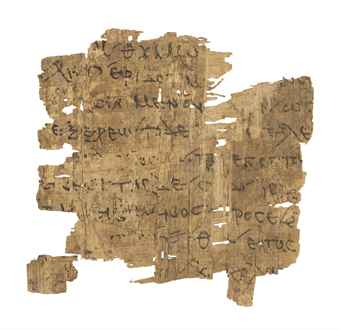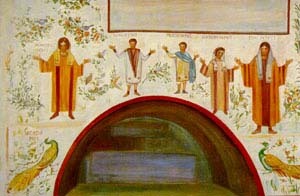The ‘Odes of Solomon’: a Late 1st Century Christian Hymnbook
I am putting on the love of the Lord…
I have been united to Him, because the lover has found the Beloved.
Because I love Him that is the Son, I shall become a son.
Indeed, whoever is joined to Him who is immortal, shall truly be immortal.
These striking words come from what has been hailed as the earliest Christian hymn book. Prior to 1909, nothing was known of the Odes of Solomon except one quotation by Lactantius (died 320). Then a Syriac manuscript was found containing, among other writings, 40 odes. Subsequent finds have shown that there were originally 42, though because of the fragmentary nature of the papyri, Ode 2 and part of Ode 3 have not survived.
An ode is simply a piece of lyrical poetry written for a particular occasion, which in Greek at least had a fixed form. However, scholars quickly established that, stylistically and ideologically, the Odes of Solomon are not from a Greek stable but a Jewish one. Dating evidence suggests late 1st – early 2nd century, at any event before the Bar-Kokhba Revolt of 132-135, when Christian Jews were evicted from synagogues.
These verses are not odes other than in a general sense, then, and there is nothing to link them to Solomon except by analogy of phrasing with the Song of Solomon in the Bible. For these Odes are clearly Christian (at one time scholars thought Gnostic, but the consensus today is that they are orthodox) and praise the person and attributes of Jesus Christ. Perhaps the titular use of Solomon’s name was a way of safeguarding the documents in a volatile political time when radical Jews were highly suspicious of Jewish followers of Christ.
What makes the Odes particularly exciting is that they clearly emanate from a community of Jewish disciples of Jesus, almost certainly from Syria. Church history from earliest times has majored on Gentile Christianity to the extent that the average reader can forget that Jewish believers continued at all beyond the fall of Jerusalem in AD 70.
It becomes clear that the writer was familiar with the biblical book of Psalms. It is nowhere exactly quoted, but in many places there are direct parallels. To give just one example, Psalm 84:10 reads: For a day in Thy courts is better than a thousand elsewhere, and in Ode 4:5 we find: For one hour of Your faith is more excellent than all the days and all the years.
What is also clear is that the writer, almost certainly a Jewish Christian in Syria, was very familiar with the writings of the Apostle John. If, as is generally agreed, the Odes date from the very end of the 1st century, it is well possible that the writer was a disciple of John. The link is noteworthy, because other (fragmentary) Jewish Christian texts, like the ‘Gospel of the Nazarenes‘ and the ‘Gospel of the Ebionites‘ lean heavily towards the more obviously Jewish slant of Matthew’s gospel (follow this link for a scholarly overview of early Jewish Christian writings).
Some of the odes are meditative expansions of Johannine themes like light and dark. John 1:1-18 presents Jesus Christ as “the light of the world”: In him was life, and the life was the light of men. The light shines in the darkness, and the darkness has not overcome it [v.3-4]. Ode 15:2 says: He is my Sun and His rays have lifted me up; His light has dismissed all darkness from my face.
The general tenor of the Odes is similar to John’s gospel in its meditative, worshipful response to the truths of Jesus. See, for example, the writer’s treatment of the incarnation [Odes 7,19], death [Ode 28], resurrection and ascension [Ode 42].
A fine example is Ode 27, which is only three verses long and which clearly grew out of worshipful contemplation of the Cross:
I extended my hands and hallowed my Lord,
For the stretching out of my hands is His sign,
And my stretching upward is the upright cross. Hallelujah.
To read the Odes of Solomon for yourself, follow this link. The Odes have of recent times been set to music – for more details, visit The Odes Project.
Archives
- January 2023 (1)
- October 2022 (1)
- August 2022 (3)
- July 2022 (3)
- May 2022 (3)
- April 2022 (3)
- March 2022 (2)
- January 2022 (3)
- November 2021 (2)
- October 2021 (3)
- September 2021 (1)
- August 2021 (1)
- July 2021 (2)
- March 2021 (1)
- February 2021 (4)
- January 2021 (2)
- December 2020 (4)
- November 2020 (4)
- August 2020 (4)
- July 2020 (1)
- June 2020 (2)
- March 2020 (1)



